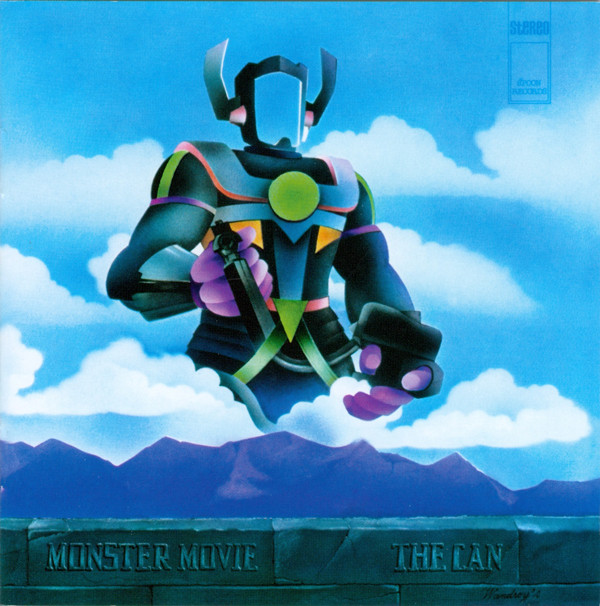
“All has been forgotten and the plastic turns to rotten.”
In 1968, Can recorded an album titled Prepared to Meet Thy Pnoom, but couldn’t find a record company that would release the off-the-wall record as their debut. Instead, they recorded the “more accessible” Monster Movie, which introduced one of the pioneering Krautrock groups to the world in 1969. Featuring a faceless Galactus on the cover, the four-song album is years ahead of its time, but it does not reach the mind-melting highs that the band would achieve in a few short years with Tago Mago, Ege Bamyasi, and Future Days.
A pioneering act in the German Krautrock movement—alongside such bands as Faust, Neu! and Popol Vuh—Can’s original lineup was an eclectic group. Two of the members, keyboardist Irmin Schmidt and bassist/electronic composer/sound engineer Holger Czukay, were former pupils of classical avant-garde composer Karlheinz Stockhausen. Percussionist Jaki Liebezeit came from a free-jazz background. Guitarist Michael Karoli was one of Czukay’s students, familiar with American and British rock music where his peers were more classically-oriented. This musical core carried the group through most of its existence. Their most lauded releases feature Damo Suzuki on vocals, but for the first few years they were fronted by eccentric American vocalist Malcom Mooney, who took a break from sculpting to sing on the first album.
Aesthetically, Monster Movie can be incredibly repellent—at least initially. The squealing guitar on opener ‘Father Cannot Yell’ is distracting if not downright off-putting. After only about a minute of pleasant looping organ, tasteful bass, and a simple drum beat, Karoli’s atonal guitar bursts take over, even as Mooney mutters his manic proclamations (the line “he hasn’t been born yet” is repeated numerous times). Eventually, Karoli backs off for a few minutes, and Schmidt, Czukay, and Liebezeit lock into a smooth, repetitious groove, while Mooney indulges in reciting “uh-uh-uh-uh-ah” over and over—which somehow doesn’t sound ridiculous. There is some neat experimentation with what sounds like a manipulated sample of a helicopter blade whirring (but I really have no idea what it is) and then Karoli comes in again and finishes out the seven-minute opener with more of the same guitar noises.
Much of Can’s output lacks conventional structure. The verse-chorus-bridge flow that a listener of pop music would expect is usually replaced by a freewheeling jam without clear delineation between sections. As well, many of Can’s recorded songs are actually live jam sessions manipulated by Czukay in the studio, often edited down from hours of improv into digestible lengths. In this unique mode of operation, “happy accidents” often arise, and the brilliant ear of Czukay brings them to the forefront of the mix. One of these off-hand gems occurs about thirty seconds into ‘Father Cannot Yell’—for a few brief seconds, Liebezeit’s steady, chugging rhythm is interrupted by a weird electronic glitching noise that perfectly encapsulates the technological doom aesthetic that the Flaming Lips mined during the 2010s on albums like The Terror.
‘Mary, Mary So Contrary’ moves with a slower tempo, but Mooney sounds just as crazed as on the opener, riffing on the ‘Mary, Mary, Quite Contrary’ nursery rhyme. Karoli’s guitar work is a little bit more creative here but is still kind of grating on first listen, and only really sounds “right” after you’ve listened to the song a few times. ‘Outside My Door’ features a fun harmonica from Mooney, and aside from his unorthodox vocals—sometimes spoken, sometimes shouted—the song is almost conventional in structure, but it eventually (d)evolves into a jam session.
The undeniable centerpiece of Monster Movie is the behemoth ‘You Doo Right’—a six hour improvisational jam edited down to a paltry 20 minutes. The track is anchored by a tribal drumbeat from Liebezeit, Mooney repeats love-letter confessions like he’s reciting a personal mantra, and the whole band locks into a cool groove for extended sequences. At several points, the music breaks down and resets while Mooney belts out lines (“You made a believer outta me!”) nearly a cappella. But it’s a better use of your time to listen to ‘You Doo Right’ than to read about it, as it is hard to capture in words everything that’s going on. Sometimes the band is locked into a tasteful rhythm, other times Mooney is singing with only rimshots from Liebezeit as accompaniment. The sonic texture achieved here is really nice and the transitions between sections of the song are seamless considering its stitched-together nature. For a twenty minute song, it goes by quickly—like ‘Halleluwah’ from Tago Mago—but I’m not sure I would be interested in the six hour version.
Can came out of nowhere, and there really aren’t many good contemporary comparisons for them until several years into their career. Possibly the only prominent artist doing similarly off-the-wall stuff in the late 1960s was Captain Beefheart, but his music was heavily influenced by blues artists and his first two albums aren’t quite as experimental as the seminal Trout Mask Replica—his landmark third album that was released months before Monster Movie. Of course, other quintessential Krautrock bands—Faust, Neu!, Cluster, Popol Vuh, Kraftwerk—would come along and join Can, but Can was there several years before the others, if not yet fully formed.
Favorite Tracks: Father Cannot Yell; You Doo Right.